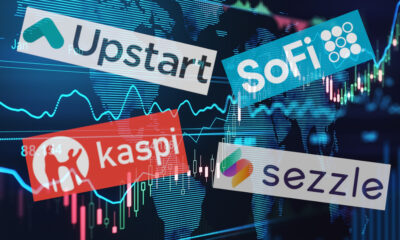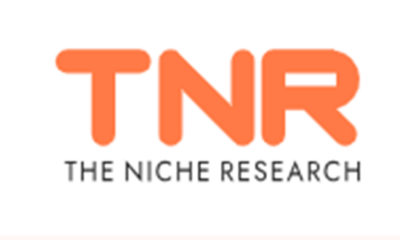Fintech
These could be the best-performing Fintech stocks through 2030

Fintech stocks aren’t exactly a new stock category. Money-related companies (such as banks and brokers) have embraced technology as a means to better serve their customers since the advent of the World Wide Web in 1989.
The financial technology sector is still rapidly evolving and could look significantly different in five years.
To that end, here’s a roundup of the three fintech stocks that could prove to be the best performers through 2030. Each company is perfectly positioned to capitalize on an opportunity that is not only sizable, but also undervalued.
SoFi Technologies
Online banking is nothing new. But it is not out of place to suggest most of the majors banks they are still struggling on this front. Their digital offerings often feel like afterthoughts and don’t necessarily mesh well with their physical presence.
That’s not the case SoFi Technologies (NASDAQ: SOFI), however. It has been built from the ground up since its launch in 2011 to be an online bank. In fact, it has no physical branches; it’s strictly an online-only outfit. It still has all the offerings you would expect from a more traditional bank, including loans, checking accounts, investments, deposits and credit cards, to name a few.
The fact is that its online-only service is more than enough to attract an increasingly larger audience. At the end of the first quarter it boasted just over 8.1 million customers, which was 44% more than in the same period last year. In fact, SoFi has added customers in every quarter since the beginning of 2020, when it only served just over 1 million members.
This is still just the beginningHowever.
You see, as much as the world (and North America in particular) has embraced the idea of managing banking matters online or through an app, we’re at something of an inflection point. That is, today’s young adults have never known a world without the Internet; most of them don’t even remember a world without smartphones. This crowd is completely comfortable with the idea of not having access to a physical bank branch. In fact, a recent survey conducted by the American Bankers Association indicates that 74% of millennials prefer digital banking services over in-person services, while 64% of Gen-Z say the same. This is in contrast to older consumers, most of whom will do their banking online or with an app, but aren’t exactly enamored with the idea of not having a physical branch to visit when needed.
It matters simply because, according to Pew Research, millennials have recently become the largest segment of the U.S. population and are entering their highest-earning wealth-building years. Don’t be surprised to see SoFi’s customer growth rate accelerate from here.
The story continues
PayPal holdings
PayPal holdings (NASDAQ: PYPL) isn’t just a fintech stock. It is probably the original name of the fintech, launched in 1998 to help the then nascent eBay start online marketplace and e-commerce business. For years it was the only player dedicated to payments technology.
Of course, serious rivals have also made their way onto the market in the meantime. To blockThe e Cash App Adyen come to mind as direct competitors, even if the alternatives are popular Amazon Pay and a handful of cryptocurrency wallets have also dented PayPal’s share of the payments intermediary market. The COVID-19 pandemic only shone a spotlight on these other payment options, as much of the world’s commerce was suddenly being handled online.
However, with all this dust finally settling, something curious is becoming clear. PayPal is still the leader of the payment platform market and is still growing. The company facilitates nearly half of the world’s online purchases, but still managed to increase total transactions last quarter by 11% to 6.5 billion. This growth follows last year’s 12% increase in the amount of total payment volume handled by PayPal.
How does the aging company hold up so well in such a competitive environment?
Much of this resilience can be attributed to the fact that it was first to market. The world is familiar with the brand and its offerings, and therefore is comfortable staying with PayPal even if alternatives are available: it is easier to keep a customer than to win a new one.
It’s also worth noting, however, that PayPal probably uses its whopping 200 petabytes of digital data better than any of its competitors, direct or indirect. This is something CEO Alex Chriss plans to do even more aggressively now that AI tools can make it even more useful.
The kicker: Newcomers will get into PayPal stock while its price is only 16 times higher than trailing earnings per share. For perspective, the S&P500‘s current price-to-earnings ratio stands at 23 times its earnings.
MasterCard
Last but not least, add MasterCard (NYSE: MA) to your list of fintech stocks to buy for their superior performance potential between now and 2030.
No, it’s not a highly regarded fintech name. This is because it has been so well defined over the past few decades as a credit card processor. Don’t be fooled though. While it is still first and foremost a card payments intermediary, it is leveraging the power of technology to continue expanding its business.
Let’s take its Labs-as-a-Service division as an example. This arm aims to “co-innovate with customers to deliver impactful, customer-centric experiences by creating innovative products, platforms and services.” This unit co-created Emirates airline’s customer rewards program, for example, while Mastercard’s so-called Test & Learn technology allows retailers to determine which products are most in demand and then stock them accordingly. Mastercard was also one of the first names to embrace the idea of cryptocurrency-based digital wallets, even without knowing what the future of cryptocurrencies would be. These and many other overlooked innovations are only made possible thanks to the advent of the right technologies, which Mastercard will gladly employ when there is a good reason.
Strengthening this opportunity is the frequency with which cash is still used to buy and sell goods and services. The US Federal Reserve reports that approximately 18% of all payments made in the United States are made in cash, while another 13% are direct bank transfers. These are transactions that would probably be better handled with a modern debit or credit card.
On that note, Mastercard’s expected revenue growth of 11% this year is followed by next year’s expected growth of more than 12%. This is significantly better than the growth rates of most other companies over the same time frame. It’s also a pace of growth that will be sustainable for at least the next few years, as Mastercard continues to figure out how to best leverage new technologies.
Should You Invest $1,000 in Mastercard Right Now?
Before you buy Mastercard stock, consider this:
The analyst team at Motley Fool Stock Advisor has just identified what they believe is the 10 best stocks for investors to buy now… and Mastercard wasn’t one of them. The 10 stocks that made the cut could produce monster returns in the coming years.
Consider when Nvidia you created this list on April 15, 2005… if you invested $1,000 at the time of our recommendation, you would have $553,880!*
Stock Advisor provides investors with an easy-to-follow model of success, including guidance on building a portfolio, regular updates from analysts, and two new stock picks every month. The stock advisory service has more than quadrupled the return of the S&P 500 Index since 2002*.
*Equity advisor will return starting May 13, 2024
John Mackey, former CEO of Whole Foods Market, an Amazon subsidiary, is a member of The Motley Fool’s board of directors. James Brumley has no position in any of the securities mentioned. The Motley Fool has positions and recommends Adyen, Amazon, Block, Mastercard and PayPal. The Motley Fool recommends eBay and recommends the following options: long January 2025 $370 calls on Mastercard, short January 2025 $380 calls on Mastercard, short July 2024 $52.50 calls on eBay, and short June 2024 $67 calls .50 on PayPal. The Motley Fool has a disclosure policy.
Prediction: These could be the best-performing Fintech stocks through 2030 was originally published by The Motley Fool
Fintech
Lloyds and Nationwide invest in Scottish fintech AI Aveni

Lloyds Banking Group and Nationwide have joined an £11m Series A funding round in Scottish artificial intelligence fintech Aveni.
The investment is led by Puma Private Equity with additional participation from Par Equity.
Aveni creates AI products specifically designed to streamline workflows in the financial services industry by analyzing documents and meetings across a range of operational functions, with a focus on financial advisory services and consumer compliance.
The cash injection will help fund the development of a new product, FinLLM, a large-scale language model created specifically for the financial sector in partnership with Lloyds and Nationwide.
Joseph Twigg, CEO of Aveni, explains: “The financial services industry doesn’t need AI models that can quote Shakespeare, it needs AI models that offer transparency, trust and, most importantly, fairness. The way to achieve this is to develop small, highly tuned language models, trained on financial services data, vetted by financial services experts for specific financial services use cases.
“FinLLM’s goal is to set a new standard for the controlled, responsible and ethical adoption of generative AI, outperforming all other generic models in our selected financial services use cases.”
Robin Scher, head of fintech investment at Lloyds Banking Group, says the development programme offers a “massive opportunity” for the financial services industry by streamlining operations and improving customer experience.
“We look forward to supporting Aveni’s growth as we invest in their vision of developing FinLLM together with partners. Our collaboration aims to establish Aveni as a forerunner in AI adoption in the industry, while maintaining a focus on responsible use and customer centricity,” he said.
Fintech
Fairexpay: Risk consultancy White Matter Advisory acquires 90% stake in fintech Fairexpay

Treasury Risk Consulting Firm White Matter Alert On Monday he announced the acquisition of a 90% stake in the fintech startup Fair payment for an undisclosed amount. The acquisition will help White Matter Advisory expand its portfolio in the area of cross-border remittance and fundraising services, a statement said. White Matter Advisory, which operates under the name SaveDesk (White Matter Advisory India Pvt Ltd), is engaged in the treasury risk advisory business. It oversees funds under management (FUM) totaling $8 billion, offering advisory services to a wide range of clients.
Improve your technology skills with high-value skills courses
| IIT Delhi | Data Science and Machine Learning Certificate Program | Visit |
| Indian School of Economics | ISB Product Management | Visit |
| MIT xPRO | MIT Technology Leadership and Innovation | Visit |
White Matter Advisory, based in Bangalore, helps companies navigate the complexities of treasury and risk management.
Fairexpay, authorised by the Reserve Bank of India (RBI) under Cohort 2 of the Liberalised Remittance Scheme (LRS) Regulatory Sandbox, boasts features such as best-in-class exchange rates, 24-hour processing times and full security compliance.
“With this acquisition, White Matter Advisory will leverage Fairexpay’s advanced technology platform and regulatory approvals to enhance its services to its clients,” the release reads.
The integration of Fairexpay’s capabilities should provide White Matter Advisory with a competitive advantage in the cross-border remittance and fundraising market, he added.
The release also states that by integrating Fairexpay’s advanced technology, White Matter Advisory aims to offer seamless and convenient cross-border payment solutions, providing customers with secure options for international money transfers.
Fintech
Rakuten Delays FinTech Business Reorganization to 2025

Rakuten (Japan:4755) has released an update.
Rakuten Group, Inc. and Rakuten Bank, Ltd. announced a delay in the reorganization of Rakuten’s FinTech Business, moving the target date from October 2024 to January 2025. The delay is to allow for a more comprehensive review, taking into account regulatory, shareholder interests and the group’s optimal structure for growth. There are no anticipated changes to Rakuten Bank’s reorganization objectives, structure or listing status outside of the revised timeline.
For more insights on JP:4755 stock, check out TipRanks Stock Analysis Page.
Fintech
White Matter Advisory Acquires 90% Stake in Fintech Startup Fairexpay

You are reading Entrepreneur India, an international franchise of Entrepreneur Media.
White Matter Advisory, which operates under the name SaveDesk in India, has announced that it is acquiring a 90% stake in fintech startup Fairexpay for an undisclosed amount.
This strategic move aims to strengthen White Matter Advisory’s portfolio in cross-border remittance and fundraising services.
By integrating Fairexpay’s advanced technology, White Matter Advisory aims to offer seamless and convenient cross-border payment solutions, providing customers with secure options for international money transfers.
White Matter Advisory, known for its treasury risk advisory services, manages funds under management (FUM) totaling USD 8 billion.
Founded by Bhaskar Saravana, Saurabh Jain, Kranthi Reddy and Piuesh Daga, White Matter Advisory helps companies effectively manage the complexities of treasury and risk management.
The SaveDesk platform offering includes a SaaS-based FX market data platform with real-time feeds for over 100 currencies, bank cost optimization services, customized treasury risk management solutions, and compliance guidance for the Foreign Exchange Management Act (FEMA) and other trade regulations.
Fairexpay is a global aggregation platform offering competitive currency exchange rates from numerous exchange partners worldwide. Catering to both private and corporate customers, Fairexpay provides seamless money transfer solutions for education, travel and immigration, as well as simplifying cross-border payments via API and white-label solutions for businesses. Key features include competitive currency exchange rates, 24-hour processing times, extensive currency coverage of over 30 currencies in more than 200 countries, and secure, RBI-compliant transactions.
-

 DeFi9 months ago
DeFi9 months agoSwitchboard Revolutionizes DeFi with New Oracle Aggregator
-

 DeFi11 months ago
DeFi11 months ago👀 Lido prepares its response to the recovery boom
-

 News9 months ago
News9 months agoLatest Business News Live Updates Today, July 11, 2024
-

 DeFi9 months ago
DeFi9 months agoIs Zypto Wallet a Reliable Choice for DeFi Users?
-

 Fintech9 months ago
Fintech9 months agoFinTech LIVE New York: Mastercard and the Power of Partnership
-

 DeFi9 months ago
DeFi9 months agoEthena downplays danger of letting traders use USDe to back risky bets – DL News
-

 Fintech11 months ago
Fintech11 months agoFintech unicorn Zeta launches credit as a UPI-linked service for banks
-

 News11 months ago
News11 months agoSalesforce Q1 2025 Earnings Report (CRM)
-

 Fintech11 months ago
Fintech11 months ago121 Top Fintech Companies & Startups To Know In 2024
-

 ETFs11 months ago
ETFs11 months agoGold ETFs see first outing after March 2023 at ₹396 cr on profit booking
-

 Videos11 months ago
Videos11 months ago“We will enter the ‘banana zone’ in 2 WEEKS! Cryptocurrency prices will quadruple!” – Raoul Pal
-

 Videos11 months ago
Videos11 months ago“BlackRock HAS UNLEASHED a massive multi-trillion monster” – Lyn Alden and Eric Balchunas

















